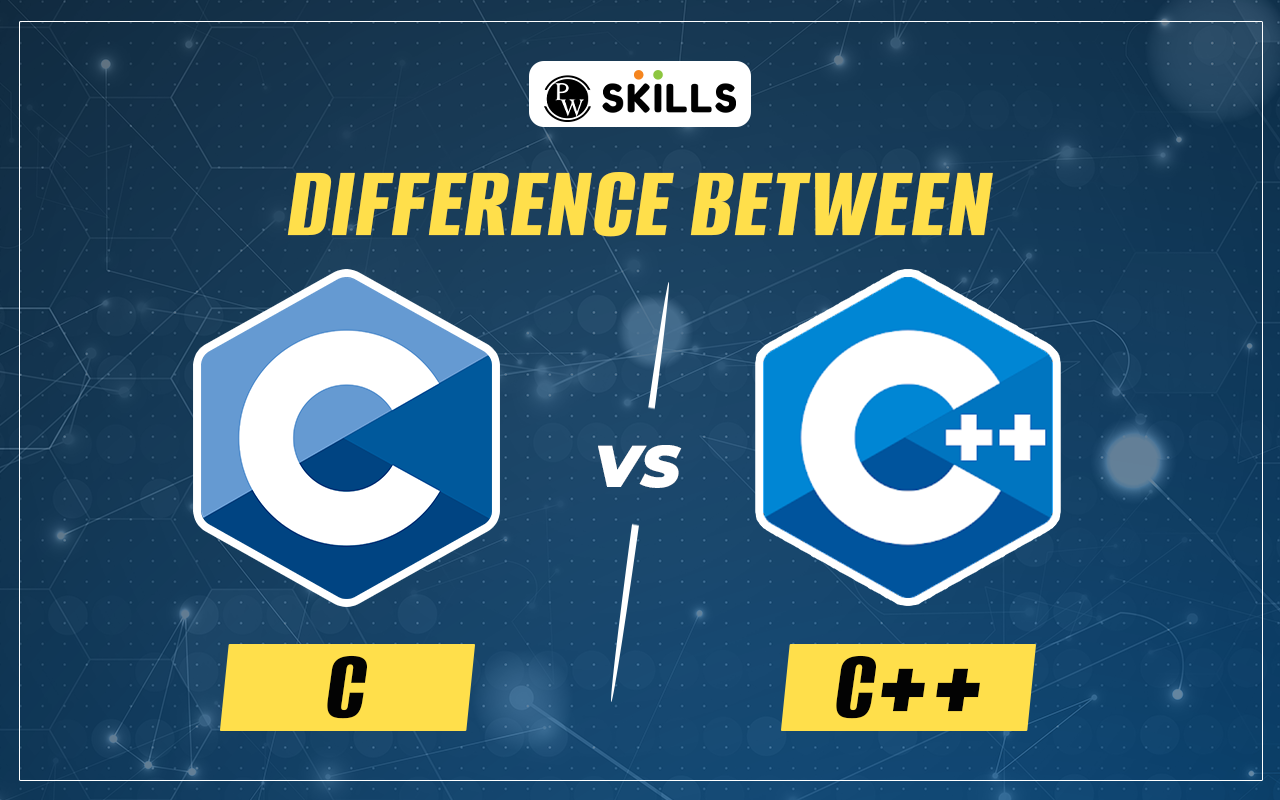Difference Between C and C++: Do you need clarification about the difference between C and C++? Well! You will find it here.
C is predominantly function-driven, relying on a procedural-oriented programming approach. In contrast, C++ is object-driven, emphasizing the use of objects and classes to structure code and manage complexity in larger software systems.
In this article, we will dive into the key differences between these two powerful languages so you can decide which is best for your specific coding project.
What is C?
C is a procedural programming language created by Computer Scientist Dennis Ritchie in 1972 at Bell Laboratories. C develops diverse software as a foundational language, from operating systems like Windows and Apple OS X to complex programs like Oracle Database, MySQL, Adobe, and the Python interpreter. Despite being a procedural language, C lacks support for Objects or Classes.
Known for its execution speed, simplicity, and flexibility, C has become the precursor for numerous other programming languages. Proficiency in C facilitates learning various programming languages, making it a widely adopted language. C is case-sensitive, distinguishing between small and capital letters in its syntax.
Also read: What Is C: Differences vs C++, Advantages and Disadvantages
Features of C Programming
Outlined below are some of the fundamental features of C programming:
- Procedural Programming Language: C is designed with an emphasis on readability and comprehension. It follows a logical structure that facilitates easy code writing and debugging.
- Structured Language: C exhibits a clear and concise syntax, adhering to a logical structure. For instance, it uses curly braces to define code blocks and semicolons to signify the end of statements.
- Portability: C programs can be adapted for execution on diverse platforms and hardware architectures. This adaptability is advantageous for developing software intended to run on various systems, including Windows, Linux, and macOS.
- Low-level Access: C grants programmers direct access to hardware and the operating system. This makes it well-suited for tasks involving interaction with the underlying system or performing actions requiring a high degree of control, such as writing device drivers or system utilities.
What is C++?
C++, a high-level programming language, was conceived in the early 1980s by Bjarne Stroustrup at Bell Laboratories. It serves as an extension of the conventional C language, incorporating support for object-oriented programming and additional functionalities. It allows programmers to address real-life situations more effectively. Object-oriented programming was introduced to address the drawbacks of conventional programming techniques, relying on key concepts to overcome these limitations.
Features of C++ Programming
Below listed the features of C++ programming:
- Templates: C++ introduces support for templates, enabling the creation of reusable code blocks. These templates are instrumental in crafting generic functions and data types, enhancing code flexibility.
- Operator Overloading: C++ permits the overloading of operators, allowing developers to define how operators behave when applied to different data types. This feature contributes to the versatility of operator usage in C++.
Also read: Who And When C++ Developed By?
Difference Between C and C++ in Tabular Form
Here are the key differences between C and C++ in tabular format:
| Difference Between C and C++ in Tabular Form | ||
| Feature | C | C++ |
| Programming Paradigm | Procedural Programming Language | Object-Oriented Programming Language |
| Class and Object | Absence of Classes and Objects | Supports Classes and Objects |
| Inheritance | Does not support inheritance | Supports Single and Multiple Inheritance |
| Function Overloading | No support for function overloading | Supports function overloading |
| Polymorphism | No support for polymorphism | Supports Compile-Time and Runtime Polymorphism |
| Encapsulation | Limited support for encapsulation | Supports encapsulation |
| Function and Operator Overloading | Limited or no support | Supports function and operator overloading |
| Header Files | Uses .h extension for header files | Uses .h extension for backward compatibility, but .hpp is commonly used |
| Memory Management | Manual memory management | Supports both manual and automatic (through constructors and destructors) memory management |
| Syntax | Simpler syntax | More complex syntax with additional features |
| Flexibility | Less flexible | More flexible and extensible |
| Exception Handling | Absence of built-in exception handling | Supports built-in exception handling with try, catch, throw |
| Use Cases | System-level programming, embedded systems | Widely used in application development, game development, system programming, etc. |
Difference Between C and C++ with Examples
Here are some examples of C and C++:
1) Programming Paradigm:
C
#include <stdio.h>
int main() {
printf(“Hello, C!\n”);
return 0;
}
C++
#include <iostream>
using namespace std;
int main() {
cout << “Hello, C++!” << endl;
return 0;
}
2) Class and Object:
C: Does not support classes and objects.
C++:
#include <iostream>
using namespace std;
class Greeting {
public:
void sayHello() {
cout << “Hello from C++ class!” << endl;
}
};
int main() {
Greeting obj;
obj.sayHello();
return 0;
}
3) Inheritance:
C: Does not support inheritance.
C++:
#include <iostream>
using namespace std;
class Base {
public:
void display() {
cout << “Base Class” << endl;
}
};
class Derived : public Base {
public:
void show() {
cout << “Derived Class” << endl;
}
};
int main() {
Derived obj;
obj.display();
obj.show();
return 0;
}
Difference Between C and C++ Syntax
Here are some key syntax differences between C and C++:
1. Header Files:
- In C, header files are included using #include directive.
- In C++, header files can still be included with #include, but the .h extension is not mandatory.
2. Standard Input/Output:
- C uses printf and scanf for output and input, respectively. Formatting codes are used for structured output.
- C++ introduces cout and cin for output and input, respectively. These are part of the iostream library, and formatting is achieved using the stream insertion (<<) and extraction (>>) operators.
3. Function Declaration:
- In C, function declarations include the return type, function name, and parameter types.
- C++ function declarations are similar but can also include access specifiers and belong to classes (methods).
4. Variable Declaration:
- Variable declaration syntax is similar in both languages. For example, int num declares an integer variable.
- C++ retains the same variable declaration syntax as C.
5. Comments:
- Both C and C++ support single-line comments (//) and multi-line comments (/* … */).
6. Object-Oriented Features (C++ Specific):
- C++ introduces classes and objects for object-oriented programming (OOP). Classes encapsulate data and methods that operate on the data.
- C does not support classes or object-oriented features.
7. Namespace (C++ Specific):
- C++ uses the namespace keyword to encapsulate entities and avoid naming conflicts.
- C does not have the concept of namespaces.
8. Standard Template Library (STL) (C++ Specific):
- C++ includes the Standard Template Library (STL) for various generic algorithms, data structures, and functions.
- C needs the comprehensive template-based functionality provided by the STL.
Also read: Understanding the Components of STL in C++
Difference Between C and C++ for Interview
Here are key distinctions between C and C++ that are often discussed in interviews:
1) Programming Paradigm:
C is primarily a procedural programming language focusing on procedures or routines. C++ is a multi-paradigm, incorporating procedural and object-oriented programming (OOP) features.
2) Object-Oriented Programming (OOP):
One of the significant contrasts lies in their approach to OOP. C lacks inherent support for OOP concepts like classes and objects. In contrast, C++ embraces a robust OOP model, facilitating features such as encapsulation, inheritance, and polymorphism.
3) Header Files:
While both languages use header files, C++ sometimes allows for omitting the ‘.h’ extension. This simplifies include statements and departs from the more explicit ‘.h’ file extensions commonly seen in C.
4) Standard Input/Output:
C relies on functions like printf and scanf for output and input operations. In C++, introducing cout and cin provides a more user-friendly and type-safe approach to handling output and input.
5) Function Declaration:
Function declarations in C typically include the return, function name, and parameter types. C++ follows a similar structure but introduces the possibility of functions belonging to classes, known as methods, and can include access specifiers.
6) Memory Management:
While both languages allow dynamic memory allocation, C++ introduces the new and delete operators, offering a more advanced and object-oriented approach. Additionally, C++ incorporates constructors and destructors for efficient resource management.
7) Namespace:
C lacks the concept of namespaces, which is crucial for organizing code and avoiding naming conflicts. C++ introduces the namespace keyword, enhancing code modularity and preventing naming collisions.
8) Standard Template Library (STL):
C++ boasts the Standard Template Library (STL), a powerful collection of template classes and functions. This library streamlines various programming tasks, providing generic algorithms, containers, and iterators. C, being an older language, needs a comprehensive template-based library.
9) Data Handling:
In C, data and functions are separate, following a procedural approach. In C++, data and functions are encapsulated together, promoting a more object-oriented structure.
10) Support for Features:
C++ is an enhanced version of C, supporting features like generic data types and exception handling. C, in contrast, lacks built-in support for exception handling.
11) Programming Approach:
C is function-driven, while C++ combines procedural and object-oriented programming approaches to support classes and objects.
12) Abstraction:
C++ introduces features like encapsulation, data hiding, and data abstraction, which are not present in C.
Similarity Between C and C++
- Both languages exhibit comparable syntax, with identical code structures and similar compilation processes. They share a fundamental syntax, where nearly all operators and keywords in C are also found in C++, performing identical functions.
- While C++ features a slightly expanded grammar compared to C, the core grammar remains consistent.
- The basic memory model in both languages closely aligns with hardware specifications.
- Common concepts such as stack, heap, file scope, and static variables are present in both C and C++.
Also read: 75 Basic Programming Problems and Tutorials for Practice
Difference Between C++ and C#
The table below summarizes the key differences between C++ and C# across various aspects, clearly comparing their features and characteristics.
| Difference Between C++ and C# | ||
| Feature | C++ | C# |
| Level of Programming | Low-level | High-level |
| Compilation Target | Machine code | Common Language Runtime (CLR) |
| Compilation and Execution | Direct compilation to machine code | Compilation to intermediate language (CLR) |
| Memory Management | Manual memory management by the programmer | Automatic garbage collection by the CLR |
| Platform Independence | Code can run on any platform | Primarily compatible with Windows |
| Object-Oriented Capabilities | Object-oriented programming language | Component-oriented programming language |
| Multiple Inheritance | Supported through classes | Not supported through classes |
| Array Bound Checking | Compiler does not perform bound checking | Compiler performs bound checking |
| Pointer Usage | Pointers can be used anywhere in the program | Pointers can only be used in unsafe mode |
| Compilation Output | Direct translation to machine code | Transformed to intermediate language code |
| Development Focus | Adherence to a specific architecture and portability | Simplicity, speed, and general-purpose development |
Difference Between C++ and Java
The below table outlines the critical distinctions between C++ and Java:
| Difference Between C++ and Java | ||
| Feature | C++ | Java |
| Memory Management | Manual memory management (e.g., pointers) | Automatic garbage collection |
| Compilation | Compiled to machine code | Compiled to bytecode (Java Virtual Machine) |
| Platform Independence | Code needs to be recompiled for each platform | “Write once, run anywhere” philosophy |
| Object-Oriented Capabilities | Object-oriented programming language | Purely object-oriented language |
| Multiple Inheritance | Supported through classes | Achieved through interfaces |
| Exception Handling | Supports both exception handling and error codes | Strong emphasis on exception handling |
| Pointers | Allows the use of pointers | No explicit support for pointers, emphasis on references |
| Garbage Collection | Manual memory management by the programmer | Automatic garbage collection |
| Compilation Output | Translated to machine code | Translated to bytecode (platform-independent) |
| Development Focus | Emphasizes efficiency and hardware-level control | Emphasizes portability and simplicity |
FAQs
How does C++ handle errors compared to C?
C++ introduces exception-handling mechanisms, allowing developers to write code that gracefully handles errors and exceptions. In contrast, C relies more on error codes and manual checks for error conditions.
Are pointers used in both C and C++?
Yes, both C and C++ support pointers. However, C++ emphasizes references, providing alternatives to traditional pointer usage.
Can C++ programs be compiled and executed on any platform like C programs?
While both C and C++ aim for portability, C++ programs may require recompilation on different platforms due to features like object-oriented programming and specific language enhancements.
How does C++ distinguish itself from the C language?
C is a structural or procedural programming language primarily employed for system applications and low-level programming tasks. In contrast, C++ is an object-oriented programming language incorporating additional features such as Encapsulation, Data Hiding, Data Abstraction, Inheritance, Polymorphism, etc. These enhancements contribute to the increased security and flexibility of complex projects.
Is C still utilized by developers?
Yes, even today, many companies and developers continue to use the C programming language.





